Photo: Ebru Yildiz
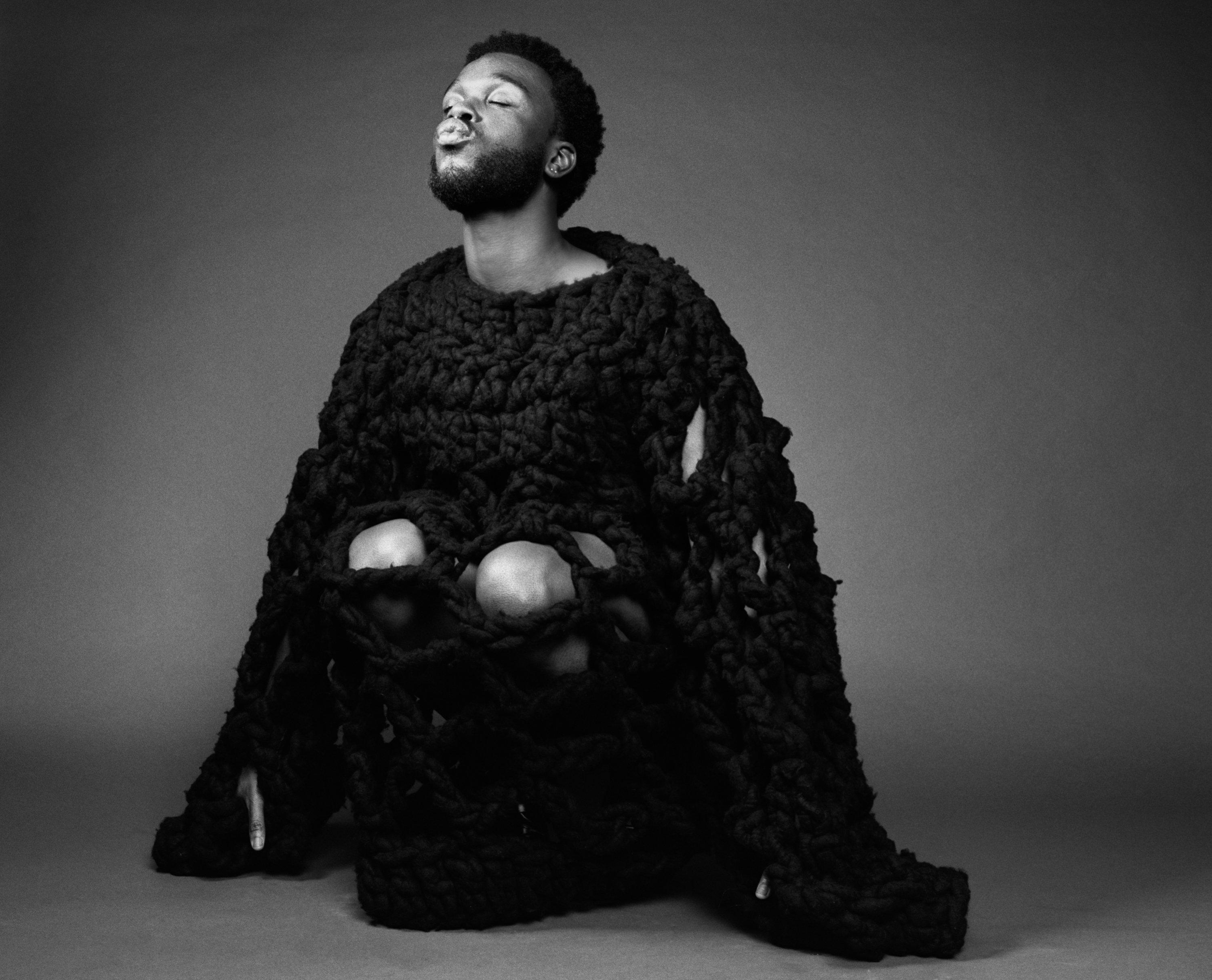
Cakes Da Killa
news
Cakes Da Killa's New 'Muvaland 2' EP Is A Joyride Back To '90s Ballroom
Powerhouse New York rapper Cakes Da Killa discusses his upcoming EP 'Muvaland 2,' performative allyship, and the new generation of LGBTQ+ artists
Ballroom culture has blown up in mainstream media thanks to series like FX's "POSE" and HBO's "Legendary," but Cakes Da Killa is here to remind you it's more than just a trend. The Brooklyn-based rapper temporarily traded spitting over high-energy hip-hop beats to glide over sparkling house melodies on last November's Muvaland EP.
Now, the rapper is back with the sequel—Muvaland 2—that continues the celebration of '90s ballroom. Cakes reconnected with New York producer Proper Villains for the euphoric time capsule, from the soon-to-be club anthem "What's The Word" to the ultra-cheeky "Taste Test." [The first two tracks are out now and the full EP drops on HE.SHE.THEY. on July 16.]
"My music has always been based on club and dance music. There weren't a lot of visibly gay rappers [at the time], so I forced myself to fit the mold of what people wanted me to do," Cakes tells GRAMMY.com over the phone. "So that's why you see me doing things like VladTV and Hot 97 because that's the market that people were trying to shove me into."
He continues: "But I have so many more sounds and elements that actually have inspired me and influenced what I do. So I had to make the decision to stick strictly to what makes me completely happy and what tells my full story as an artist. Sonically, this is me going back to basics 'cause it kinda sounds like my first mixtapes."
Below, Cakes Da Killa discusses his new EP, performative allyship, and the new generation of LGBTQ+ artists.
Did it feel like a release to have such high-energy music to escape from all the mess?
I've been an independent artist for a little over a decade and I was blessed to be able to just survive off of my art. As an adult, I've never had to work at a job. But when the pandemic came, a b**** had to become real essential, really quick. [Laughs.] I had to get a job. So I needed balance. It was like the reality of, "Okay you're working this job now to pay your bills, but I still want to be creative." So that's where the carefree energy came from. I recorded it in Proper Villains' apartment on this home set up, so it's just very D.I.Y.
"Taste Test" is my favorite on the new EP because it's so c*nty. When you're talking about p***y I was like, "Yes, this is what I need!"
Right! I think that's going to be a cute single that people are going to gravitate towards. I wrote that in my mind being like, "If I had to write a song with Lady Miss Kier of Deee-Lite, how exactly would I want it to go?" I couldn't get her on the record, but I'm just trying to do her justice. So I'm proud of that track too.
You also have "Stoggaf" named after the [homophobic] slur. I have friends who believe they should reclaim the word.
I don't even think about it that deep. As someone that's grown up being called a f****t, I have a different experience of how I dealt with it. People deal with traumas differently. But I also feel like how people think about reappropriating the word or whether or not the word empowers them or not has a lot to do with what generation you were born in. 'Cause I noticed a lot of the kids coming up now, they don't use the word.
But I also don't identify as queer because when I was coming up, that was an academic word. That wasn't a word that we use in our day-to-day, you know what I'm saying? I had to spell it backward because I don't think you could put the word on Spotify. [Laughs.] But there's an Ultra Naté song called "10,000 Screamin' F****ts" that they would play in the club back in the day. I'm more old-school, girl. I'm going to do something and if you like it, you like it. If you don't, you don't.
What do you identify as? I want to get it correct here.
Well, I'm definitely marketed and branded as a homosexual. But now that I realize it, I guess on paper, I will be pansexual based on some of these most recent interactions. [Laughs.] But I've been very much socialized as a gay man. So that's how I move through the world. I get the process of labels and how they empower people, but I also feel like labels catch people up. Even when people label themselves as "queer" they work their identity to fit in whatever that means to them. I think that that's also very limiting. So I just live through life being like, "Hi, my name is Cakes" and you take it as that.
Are pronouns a big deal for you?
Pronouns are really big right now. I just had this conversation with one of my friends and I was like, "I identify as 'he' and 'him.'" But I also don't believe in the binary. I do believe everybody is non-binary because I don't think there's no such thing as just a man or a woman. I identify as a man because that's just what it was for me. And I also don't feel uncomfortable with that title. Coming up, me and my friends would call each other "she" or "b****" because that was also very popular. But I wouldn't label myself as non-binary because that kinda has a look and a vibe right now, and I wouldn't want to encroach on that.
I'm an LGBTQ+ ally, but a lot of straight allies often try to be overly performative.
Right. They'd be like, "Yass b****! Work honey!"
Are they actually supporting this community or do they just want to be seen?
I think people are going to be people regardless because we could talk about that the same way we could talk about a lot of gay men who perform cis-women traits. Like when they imitate their mothers and aunties as comedy—a lot of women don't like that either. I just feel like people just need to work on having a little bit more class. Being performative could be fun sometimes because that adds some depth to life. But when it becomes a little too pandering or overkill... What you realize walking through life, a lot of people don't know who they are. They don't have their own identities, that's why they subscribed so much to these titles and labels.
I learned about ballroom culture watching "POSE" and Paris Is Burning. Of course, there are pros and cons to it becoming more mainstream. On one hand, it gets whitewashed, but on the other hand, people could learn from it.
I think it's great because there has always been a lot of talent in the ballroom scene for years. There have also been active members who maneuvered in the mainstream industry who couldn't really speak about their ballroom identity because it was like a taboo. It was looked down upon for years to be affiliated with ballroom. So I like that we now can now look at all these stylists, designers, hairdressers, and makeup artists who are actually children of the ballroom scene. They're finally getting their just dues.
Obviously the whitewashing and all that is annoying, but that just comes with the territory. So like you said, it has its pros and cons. But I just feel like people should appreciate ballroom for what it is and don't make it a fad because it's really a lifestyle for a lot of these kids. A lot of people that participate in ballroom don't come from Oz. They need ballroom, you what I'm saying? It's not a fad. So I think people should respect it as such.
It's been a year since the protests for George Floyd, Breonna Taylor and the Black trans community. What do you think has changed?
What's good about that is it definitely influences the younger generation. I think everyone should just be good people and respect people, but that doesn't happen 'cause we don't live in a perfect world. But I also don't live life tracking who's racist. I face problems and I address things head-on.
At that time [of the protests], I'm Black, I'm gay, I'm dealing with a pandemic. I had people telling me that it was probably in poor taste for me to drop a record that's so high energy. But I did it because there are people that need that. There are people locked in their f***ing apartments. Let somebody have a cocktail and dance in their living rooms before they armor themselves to face the day.
What's your favorite cocktail?
Anything that's wet, baby. [Laughs.]
What other work needs to be done within the music industry?
Even being inclusive in the industry is performative. It's like, come on, we have one fat one, one gay one, one Asian one. It's all for looks at the end of the day. But I also hold those people accountable because I came up at a different time where I wasn't just the only gay one in the room. It was me and like a slew of other girls and we were all doing our thing. I couldn't take that pressure just being the only one anyway, 'cause it would just be a disservice to me, especially as someone that knows the history.
You have to talk about the other people that came before you and also the people that came after you because you're not the moment. It makes it seem very one-note as far as just the racial and social justice. I hold white people accountable every day. I always talk about race to the point where some people are like, "We're just talking about music. Why does it have to be a race thing?" And I'm like, "Did you not watch Ma Rainey's Black Bottom? It's always been about race."
Racism is the backbone of this country, we can't not discuss it.
Exactly. You have to challenge the aggressive white person but also the pseudo "woke" white person as well. They have Black friends, they're chill and they know what's going on. They listen to Snoop Dogg, but you have to challenge their asses too because nobody is perfect. Everybody could be better.
I think you, Le1f, Rye Rye, and Mykki Blanco helped set the tone for this new generation of Black LBGTQ+ artists.
We came up in the underground. So we didn't have major labels, the limelight, the glitz and glamour. We had to fight for everything we got. We couldn't coopt an underground look 'cause we had to be our own artists. Biting people's styles and sounding like someone else was corny when I was coming up. Now, I think it's a shift where you have mainstream artists looking like underground artists, but they're not really underground.
I don't think there's a lot of authenticity, but that has always been a thing since the music industry was the music industry. That has nothing to do with if you're queer, straight or asexual. So I just like to maneuver on my own planet. I stay true to myself and I tip my hat off to anybody that's being visible, whether you're bringing attention to different body types or different sexualities or disabilities or whatever the f***--you want to make the world a better place. I'm just like, "B****, just be authentic and talented."

Photo: Amy Lee
list
5 Rising L.A. Rappers To Know: Jayson Cash, 310babii & More
From San Diego to the Bay Area, Seattle and beyond, the West Coast bursts with talent. Los Angeles is at the heart of this expanse, and these five rappers are just a few who are showcasing the vibrant sounds of West Coast hip-hop.
GRAMMY winners Kendrick Lamar and Mustard have long repped their California roots. Earlier this summer, their powerhouse anthem "Not Like Us" brought West Coast rap back to its roots and shone a global spotlight on the scene.
Lamar and Mustard are at the forefront of a renaissance in West Coast rap. Their shared roots in Southern California cities — Mustard from Los Angeles and Kendrick from Compton — adds authenticity and resonance to their partnership. Their undeniable chemistry was on display in the video for "Not Like Us," which received a million views less than an hour after its release.
Mustard's signature beats and Lamar's profound lyricism has resurfaced the sound and culture that makes West Coast rap so unique and paved the way for a new generation of artists. All signs suggest that another impactful collaboration may appear on Mustard's upcoming album, Faith of A Mustard Seed.
Learn more: A Guide To Southern California Hip-Hop: Definitive Releases, Artists & Subgenres From L.A. & Beyond
Kendrick Lamar headlined the electrifying Pop Out concert on Juneteenth, which also featured sets from Mustard and DJ Hed. The event saw a handful of L.A. rappers, opening for Lamar in a showcase of the vibrant talent that defines the region's rap scene.
The West Coast is a vast reservoir of talent, stretching from the Bay Area to Seattle. At the heart of this creative expanse is Los Angeles, which brings fresh perspectives, innovative styles, and renewed energy to hip-hop, ensuring the genre thrives. With the stage set for these newcomers to shine, it's the perfect time to take a closer look at some of the rising talents poised to impact the rap scene. While this list only scratches the surface, it offers a glimpse into the diverse and exciting talent from SoCal, the epicenter of the West.
Blxst
Arising from Los Angeles, Blxst initially played the background as a producer but soon demonstrated his ability to excel across all facets of music creation. Blxst's breakout moment came with his platinum-certified single "Chosen," which solidified his place in the music industry. His collaboration on Kendrick Lamar's "Die Hard" from Mr. Morale And The Big Steppers further showcased his skill for crafting hooks that elevate tracks, resulting in two GRAMMY nominations.
As he prepares to release his debut album, I'll Always Come Find You on July 19, Blxst stands at a pivotal point in his career. With a great resume already to his name, his forthcoming album promises to showcase his undeniable talent and leave a lasting impact on the West Coast music scene.
Bino Rideaux
Bino Rideaux is a South Central native and frequent collaborator with the GRAMMY-winning rapper Nipsey Hussle. He is the only artist to have a joint project with Hussle, No Pressure, released before the prolific rapper's untimely death. Rideaux has hinted at having a treasure of unreleased music with Hussle, saved for the perfect moment and album.
Rideaux is known for creating tracks that get the city outside and dancing. He has made three beloved projects with Blxst, titled Sixtape, Sixtape 2, and Sixtape 3 resulting in sold-out shows and a special place in West Coast Rap fans' hearts. Endorsed by industry heavyweights like Young Thug, Rideaux continues to carve his path at his own pace. His journey is nothing short of a marathon, echoing the enduring legacy of his mentor.
Kalan.FrFr
Kalan.FrFr, whose name stands for "For Real For Real," is an artist whose music is as genuine as his name suggests. Growing up in Compton and Carson, Kalan.FrFr has always stayed true to his roots, and exudes the unyielding confidence essential to making it in the City of Angels.
His breakthrough mixtape, TwoFr, showcased his ability to shine without major features, delivering verses with catchy hooks and melodic rap. He's shown he's not confined to one sound, delivering vulnerable tracks like "Going Through Things'' and "Never Lose You." His EP Make the West Great Again, Kalan.FrFr both proves his loyalty to his origins and highlights his versatility. Kalan.FrFr's signature punch-in, no-writing-lyrics-down style keeps his fans on their toes, ensuring that whatever comes next is unpredictable but authentic.
Jayson Cash
Jayson Cash, a rapper hailing from Carson — the same city as TDE artist Ab-Soul — stays true to West Coast rap, from his lyrics to his beat selection. Listening to Jayson Cash's music is like diving into a vivid life narrative. His prowess as a lyricist and storyteller shines through in every verse. He gives his fans an insight into his journey, making it a relatable music experience.
Cash made waves with his debut mixtape, Read The Room, and scored a Mustard beat on the song "Top Down." Two years later, their collaboration continues, with Cash writing on Mustard's upcoming album. Though often seen as an underdog, Cash is not to be underestimated, earning cosigns from West Coast legends like Suga Free and Snoop Dogg. His latest project, Alright Bet, includes a notable feature from Dom Kennedy.
310babii
310babii has achieved platinum-selling status at just 18 years old, while successfully graduating high school. Yet 310babii's career began in seventh grade, when he recording songs on his phone showing early signs of motivation and creativity. His 2023 breakout hit "Soak City (Do It)" quickly gained traction on TikTok — and caught the ears of Travis Scott and NFL player CJ Stroud.
As the song grew in popularity, it led to a remix produced by Mustard, who invited the Inglewood native to join him onstage during his set at The Pop Out. 310babii's innovative spirit shines through in his distinctive visuals, exemplified by the captivating video for his song "Back It Up." His recent debut album, Nights and Weekends, released in February, underscores his evolving talent and promise within the music industry.
Latest News & Exclusive Videos

Behind Ryan Tedder's Hits: Stories From The Studio With OneRepublic, Beyoncé, Taylor Swift & More

Crowder Performs "Grave Robber"

NCT 127 Essential Songs: 15 Tracks You Need To Know From The K-Pop Juggernauts

5 Rising L.A. Rappers To Know: Jayson Cash, 310babii & More

Why Elliott Smith's 'Roman Candle' Is A Watershed For Lo-Fi Indie Folk
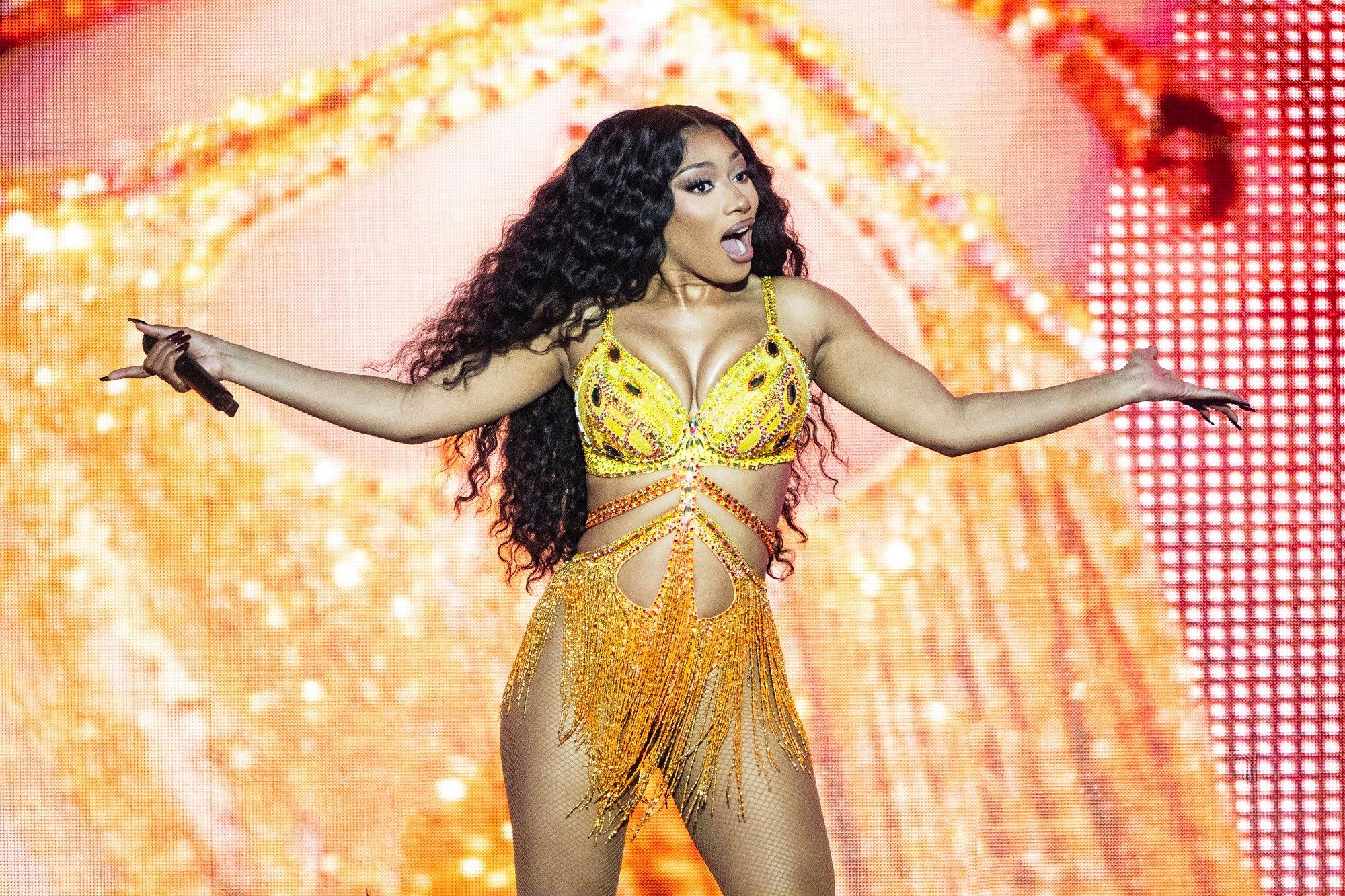
Photo: Erika Goldring/Getty Images
list
6 Takeaways From Megan Thee Stallion's 'Megan': Snakes, Shots & Self-Assurance
From the serpentine theme to Japanese rhyme schemes, Megan Thee Stallion's third album snatches back her own narrative and isn't afraid to take a bite.
Beware of venom: Megan Thee Stallion is not biting her tongue on her new album, simply titled Megan.
The GRAMMY winner's first full-length release in two years is also the first to drop under her own control. Fans have been ready for this release even before the first single, "Cobra," came out in November. The second single, "Hiss," followed in January and brought the star her first No. 1 hit on the Billboard’s Hot 100 and Global 200 charts. These songs, as well as the third single, "BOA," foreshadowed a certain slithery theme that helped shape the album.
Megan was released on June 28 and features guest stars such as GloRilla, Victoria Monét, Big K.R.I.T. and Kyle Richh as well as her longtime ace producers like Juicy J (who made "Hot Girl Summer" among other calling cards) and LilJuMadeDaBeat, who produced Stallion anthems like "Big Ole Freak," "Body" and "Thot S—."
Here’s what we learned from listening and vibing to the latest work by three-time GRAMMY winner Megan Thee Stallion.
A Theme Snakes Through Megan
As could have easily been predicted from the first three singles "Cobra," "Hiss" and "BOA," and now the album track "Rattle," there is a hint of a snake theme that wends its way through the album from beginning ("Hiss") to end ("Cobra").
In several songs, she denounces all the snake behavior that she has encountered from former lovers, friends, and haters who support those who have caused actual harm to her. In the music video for "Cobra," Megan literally sheds her old skin to reveal a shining new layer.
Megan Is Calling The Shots This Time
"I feel like Biggie, 'Who Shot Ya?’/But everybody know who shot me, bitch/ So now, let’s stop speaking on the topic," she rapped in "Who Me (feat. Pooh Shiesty)" off her 2022 album Traumazine. MTS was referencing the July 2020 incident in which rapper Tory Lanez shot her in the foot, and was subsequently charged with assault with a semiautomatic firearm and carrying a loaded, unregistered firearm in a vehicle.
Turns out, she wasn’t done referencing the topic. Now, she’s one taking the shots. MTS takes aim at less-talented women rappers on "Figueroa" (named for a Los Angeles street known for prostitution), and at Lanez on "Rattle," when she suggests that his male supporters should schedule a conjugal visit with him in prison. (Lanez is currently serving a 10-year sentence while simultaneously going through a divorce with wife Raina Chassagne.)
More Megan Thee Stallion News & Videos
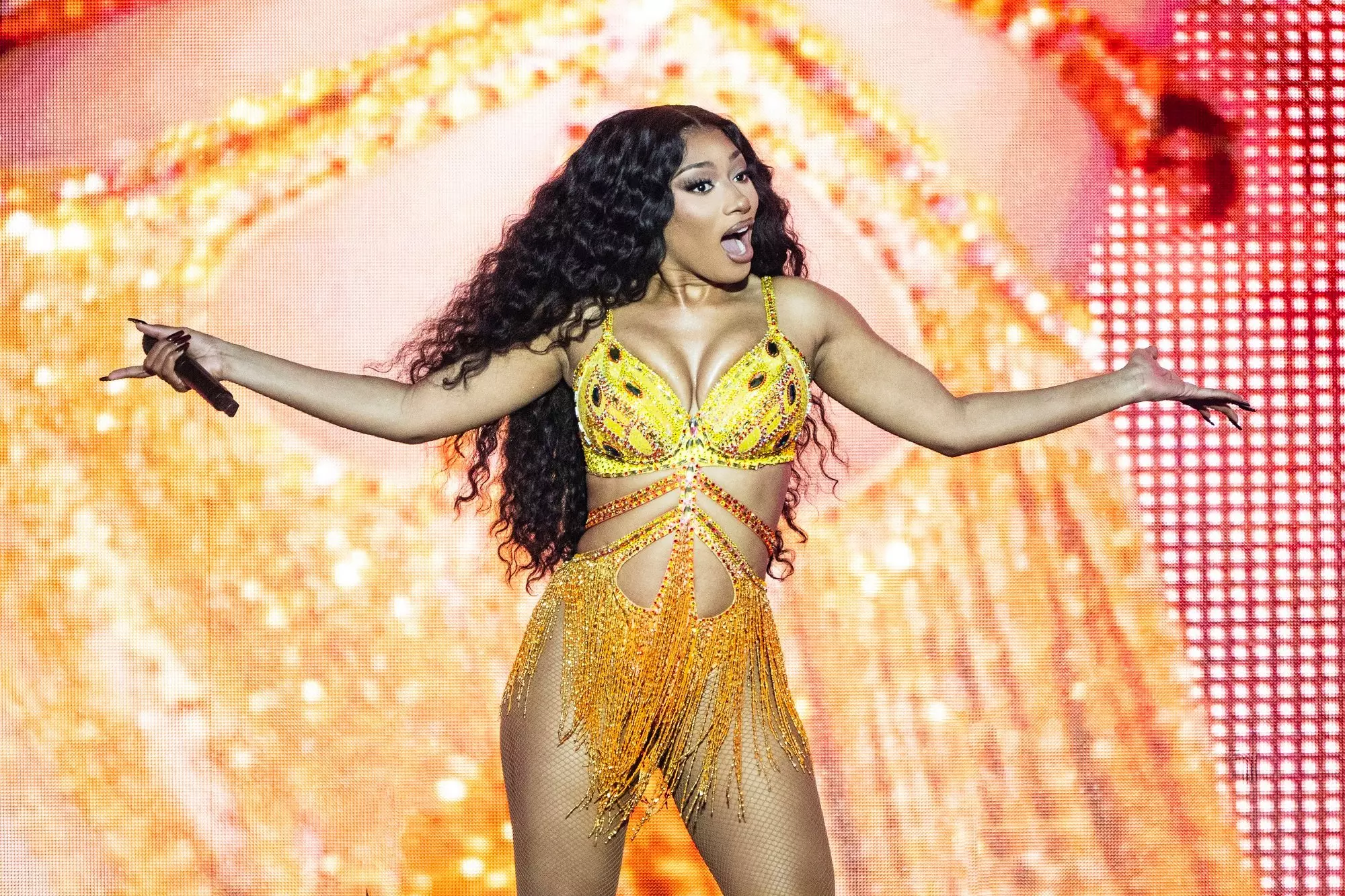
6 Takeaways From Megan Thee Stallion's 'Megan': Snakes, Shots & Self-Assurance
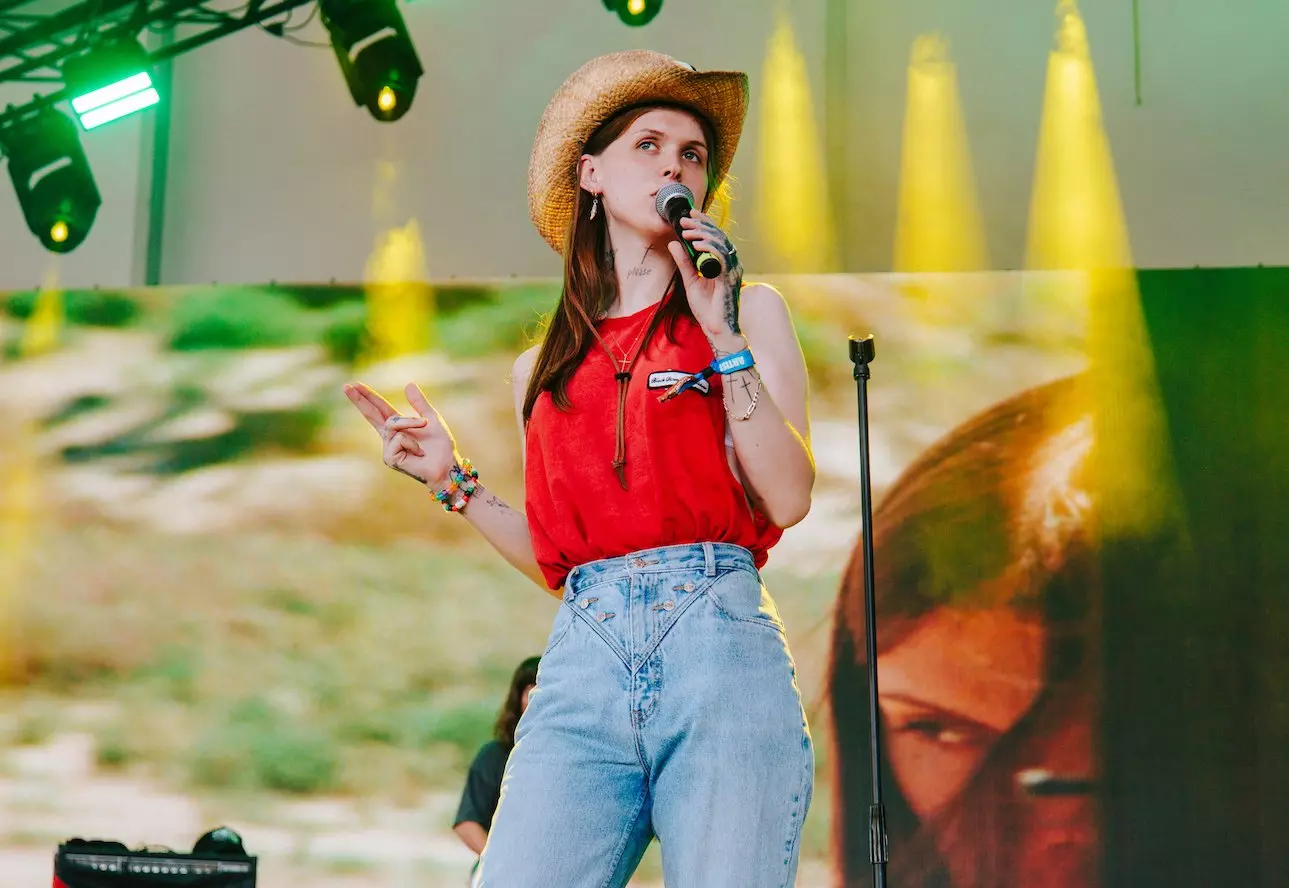
9 Epic Sets From Bonnaroo 2024: Ethel Cain, Melanie Martinez, Megan Thee Stallion & More
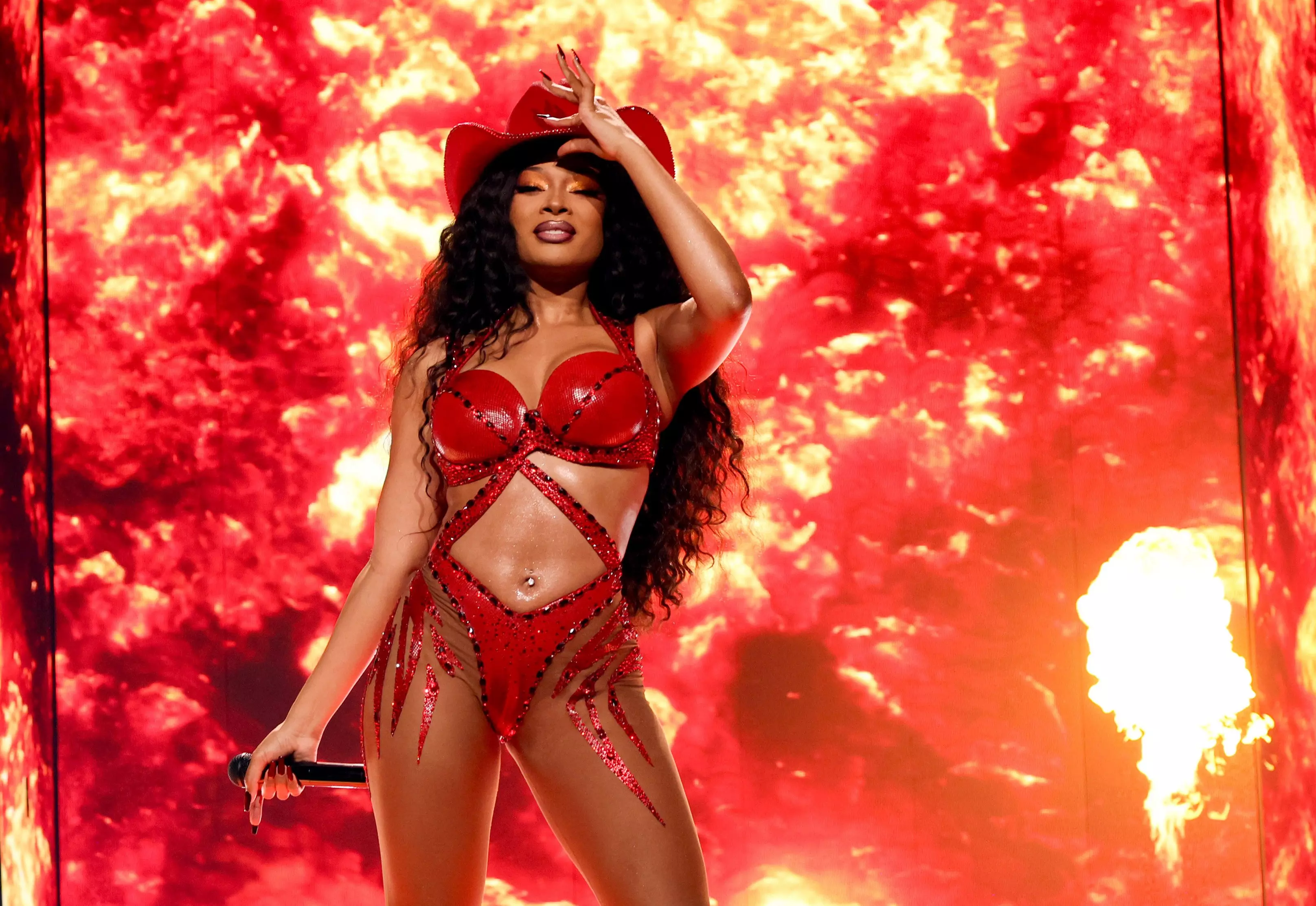
5 Iconic Moments From Megan Thee Stallion's Houston Hometown Shows
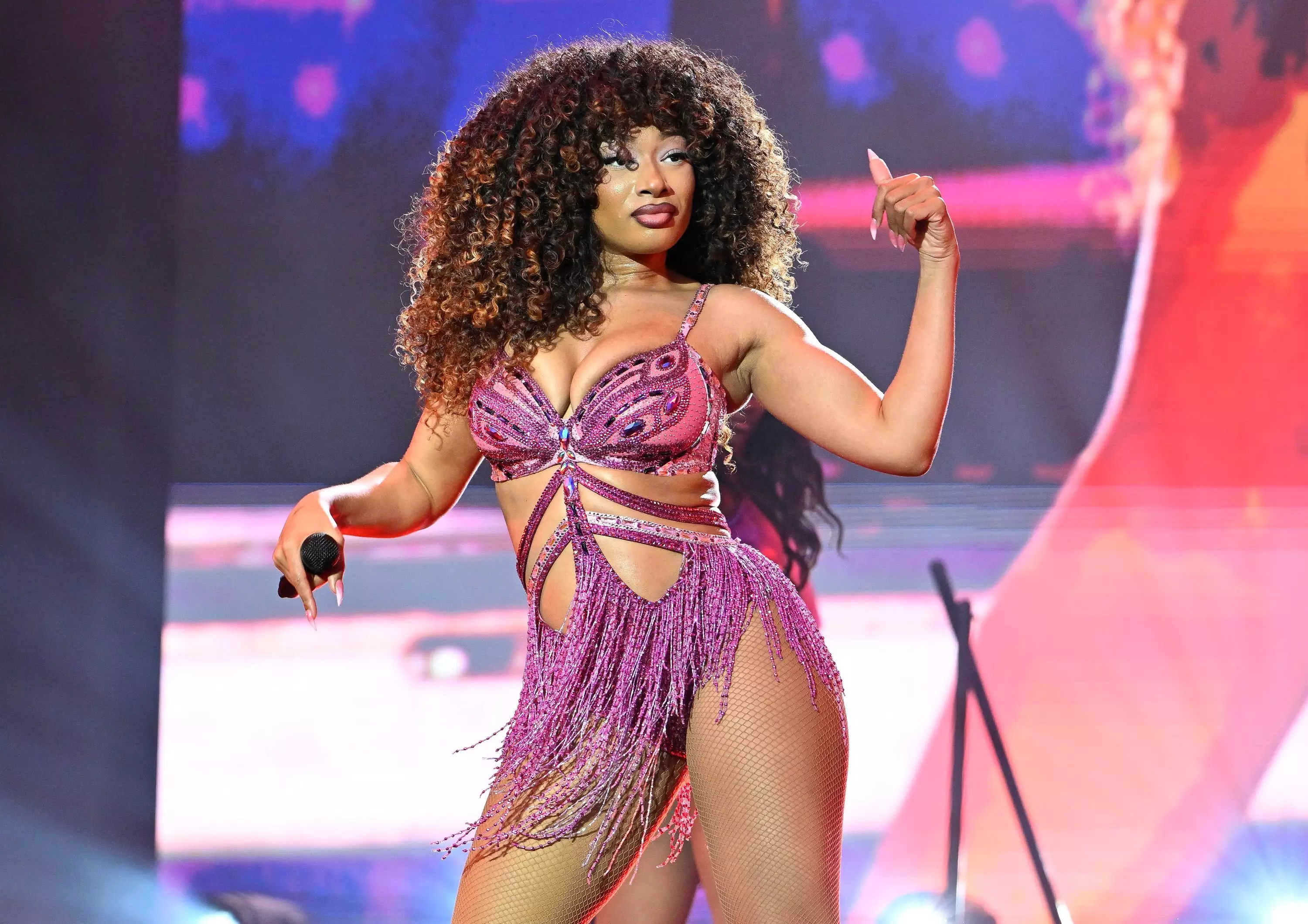
Everything We Know About Megan Thee Stallion's New Album 'Megan': Tracklist, Release Date & More
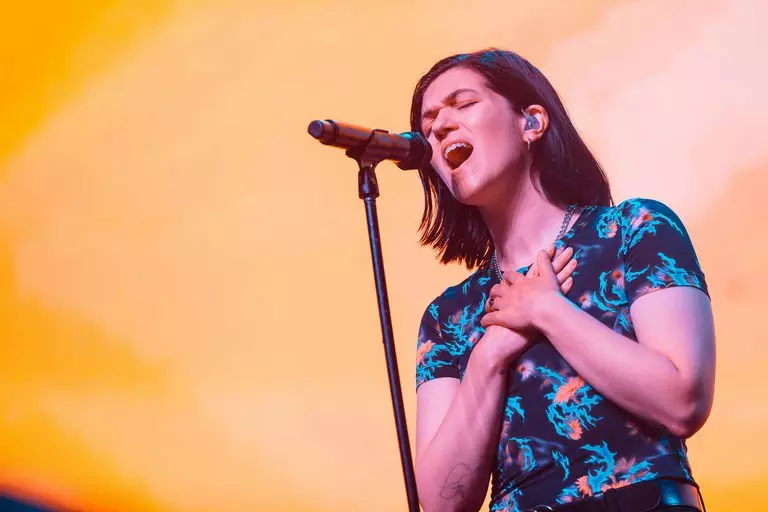
15 LGBTQIA+ Artists Performing At 2024 Summer Festivals
Inspiration Comes From Everywhere
The star and her collaborators incorporate unexpected musical influences on Megan via creative sampling. Megan Thee Stallion speeds up and flips Teena Marie's 1984 ballad "Out on a Limb" for "B.A.S." — a song she co-produced with her longtime ally LilJuMadeDaBeat. "BOA" is cleverly crafted from sounds in the first solo hit by Gwen Stefani, 2004’s "What You Waiting For?"
UGK are reunited from across the heavenly divide on the Juicy J-produced "Paper Together," with Bun B contributing new work and the late Pimp C joining in lyrical spirit. This is especially significant when considering that Juicy J produced "Intl’ Players Anthem (I Choose You)," UGK’s 2007 hit with Outkast. Juicy J also made the beats for Megan’s famous song "Hot Girl Summer."
That’s just the tip of the iceberg when it comes to samples waiting to be discovered on Megan. There are many more riffs and other musical notions that the sample bank in our brains have yet to detect.
Self-Love Is Queen
Whether she’s affirming, "I’m worthy, not worthless" on "Worthy," or literally touching herself in the auto-erotic "Down Stairs DJ" (which joins masturbation masterpieces like Divinyls’ "I Touch Myself" and Tweet’s "Oops"), Megan is grounded in songs that promote self-love as the best kind of love.
She does admit that this is sometimes a challenge to embody, as when she talks about lingering depression on "Moody Girl." But the album generally moves towards the light.
She Loves Japan
One of the big surprises on Megan is that she raps in two languages. She rhymes beautifully in Japanese on "Mamushi" with Yuki Chiba, a seasoned rapper from Japan who is influenced by the Southern swag. (Just take a look at the Memphis moves and Houston rhyme schemes of his viral song "Team Tomodachi.")
On "Otaku Hot Girl," she raps about the manga series "Naruto" and drops other anime references to show her love of Japanese pop culture.
Learn more: 10 Neo J-Pop Artists Breaking The Mold In 2024: Fujii Kaze, Kenshi Yonezu & Others
Megan's Game Is Tight
Megan is the first album to be released on Megan Thee Stallion’s own label. It follows her split from 1501 Certified Entertainment, a record label with which she was engaged in a protracted and ugly legal battle for earnings.
She now has the muscle of the major label Warner Brothers as a partner for her independent venture, Hot Girl Productions. She also recorded an Amazon Original song called "It’s Prime Day" for a commercial, as well as an exclusive Amazon edition of Megan.
It’s safe to say that this album represents a new level of business freedom and acumen for Megan Thee Stallion.
PRIDE & Black Music Month: Celebrating LGBTQIA+ & Black Voices

Celebrating 30 Years Of Essence Fest: How New Orleans & Multi-Generational, Diasporic Talent Create The "Super Bowl Of Culture"

Celebrating Missy Elliott: How The Icon Changed The Sound, Look & Language Of Hip-Hop

Tekno Talks New Music, Touring America & His "Elden Ring" Obsession

5 LGBTQIA+ Record Labels To Check Out: Get Better Records, So Fierce! And Others

Celebrate 40 Years Of Def Jam With 15 Albums That Show Its Influence & Legacy
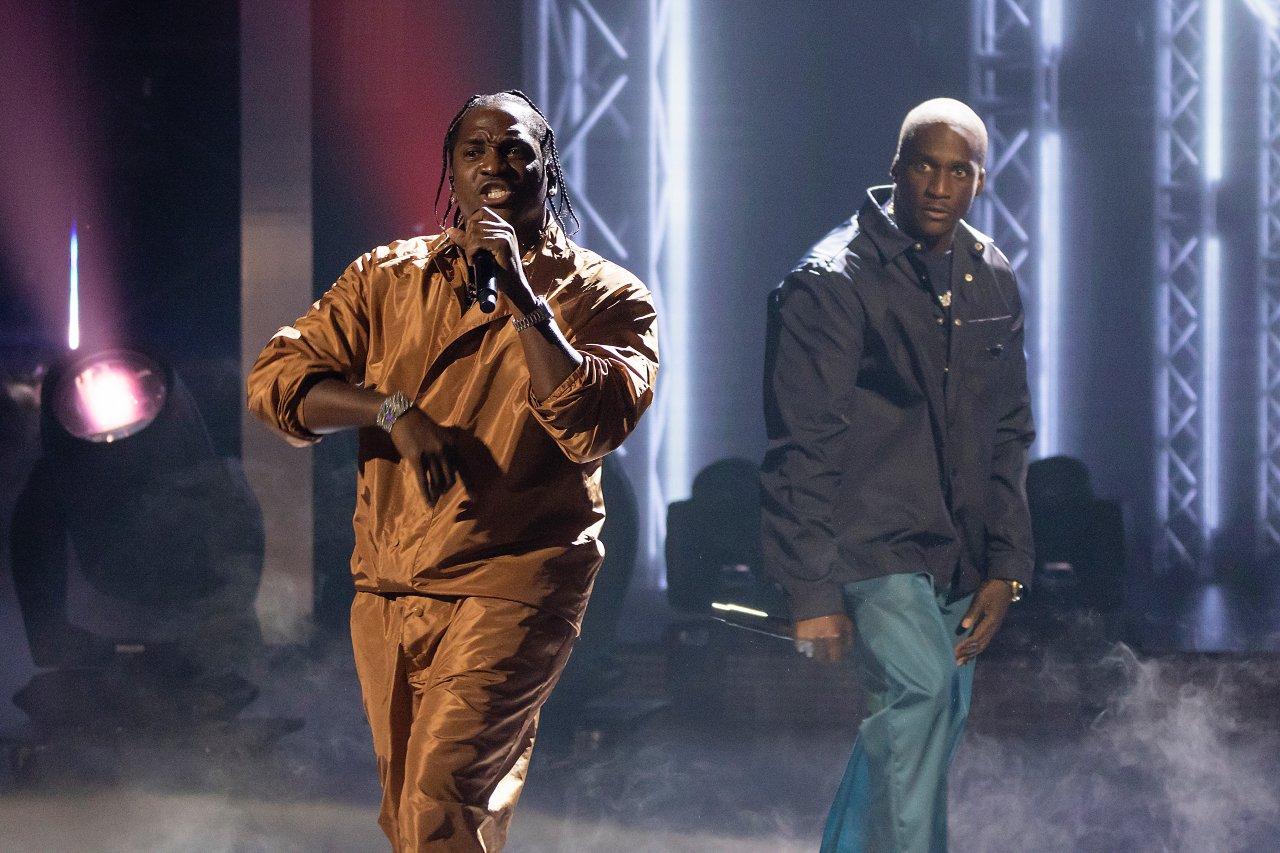
Photo: Terence Rushin/Getty Images
news
Everything We Know About Clipse's First Album In 15 Years: Pusha T And Malice Rise Again
While there's no title or release date for the new Clipse album, brothers Pusha T and Malice have teased the essence of the project, including a preview of their first new song, "Birds Don’t Sing," since 2009.
Legendary Virginia Beach rap duo Clipse have mostly been on ice since 2009's Til the Casket Drops — and that decade and a half off ends now.
The duo, composed of brothers and rap phenoms Pusha T and Malice, is back with a new, John-Legend-featuring song, "Birds Don't Sing," from a reunion project whose title has yet to be disclosed. Listen to a preview of the new song, their first new track as the Clipse since 2009, below.
It's bracing to hear purveyors of witty, sneakily profound coke raps get real about the deaths of their parents: "Lost in emotion, mama's youngest / Tryna navigate life without my compass," King Push raps at the outset. "Some experience death and feel numbness / But not me, I felt it all and couldn't function.”
It only gets realer from there: "You told me that you loved me, it was all in your tone / 'I love my two sons' was the code to your phone," Malice raps in his verse. If "Birds Don't Sing" is any indication, Clipse's first album in forever will be illuminating indeed.
We don't know much about the "Grindin'" hitmakers' reunion album, other than what Pusha T and Malice revealed in a wide-ranging Vulture interview. But for hip-hop fans, the breadcrumbs they dropped are enticing indeed.
It Will Reflect The Clipse's Maturation
Pusha T is vocal about hating the Pharrell-produced Til The Casket Drops, which has always left their story hanging. They seem to be all in on this LP — one that's designed on their own terms.
"I think the album shows the supreme maturation of a rap duo," said Push. "I think this is where you get the difference between taste and filler. This music is curated. This is a high taste-level piece of work.
"You can only have that level of taste when you have the fundamentals down to a science," he continued. "I think it's been definitely missing. Then there's the competitive aspect." Added Malice: "This is smart basketball. It's fundamentals."
Read more: For The Record: How Clipse's Lord Willin' Established Virginia's Foothold In Rap
Pharrell Williams Produced The Entire Album
Despite Pusha T's reservations about Til The Casket Drops, Pharrell Williams has been an integral part of the Clipse's operation since the beginning — and he returns to produce the new project.
"Pharrell producing everything is also an ode to the type of music and the type of albums we want to make," he added. "We still want to make full bodies of work. These are movies, man. These aren't just songs. This isn't just a collection of joints we went in and banged out."
Maturation Doesn't Mean Abandoning Coke Raps
As Pusha T points out in the interview — yes, they rap about selling coke, but to reduce it to that is to miss the point entirely.
"There's no way that you can listen to that level of storytelling and experience and just walk away just saying 'That's coke rap.'" Malice says. "If you just want to say that it's just crack rap, then you can't even assess what's really being said or what's going on."
Indeed, what the Clipse staked their claim on isn't off the table. In fact, it's lined up and ready.
Get Ready For A Bona Fide Clipse Era
As Pusha T stresses, this Clipse revisitation will come from multiple directions: "Appearances, touring, and a rap album of the year" are coming down the pike.
As more information about the forthcoming Clipse album flows in, keep GRAMMY.com bookmarked so you know the details — as these fraternal MCs join forces once more.
Latest Rap News & Music

5 Rising L.A. Rappers To Know: Jayson Cash, 310babii & More

6 Takeaways From Megan Thee Stallion's 'Megan': Snakes, Shots & Self-Assurance

Celebrate 40 Years Of Def Jam With 15 Albums That Show Its Influence & Legacy
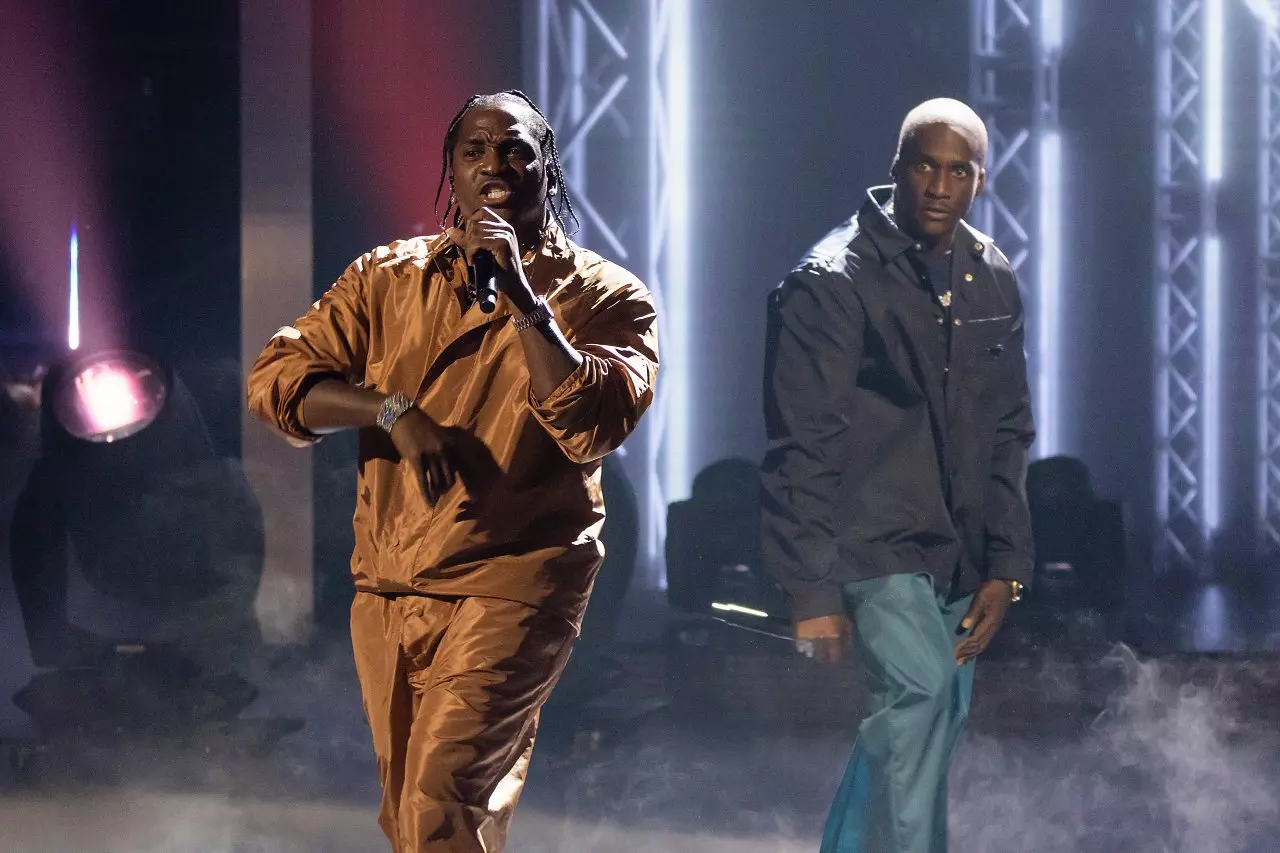
Everything We Know About Clipse's First Album In 15 Years: Pusha T And Malice Rise Again

5 Iconic Moments From Megan Thee Stallion's Houston Hometown Shows
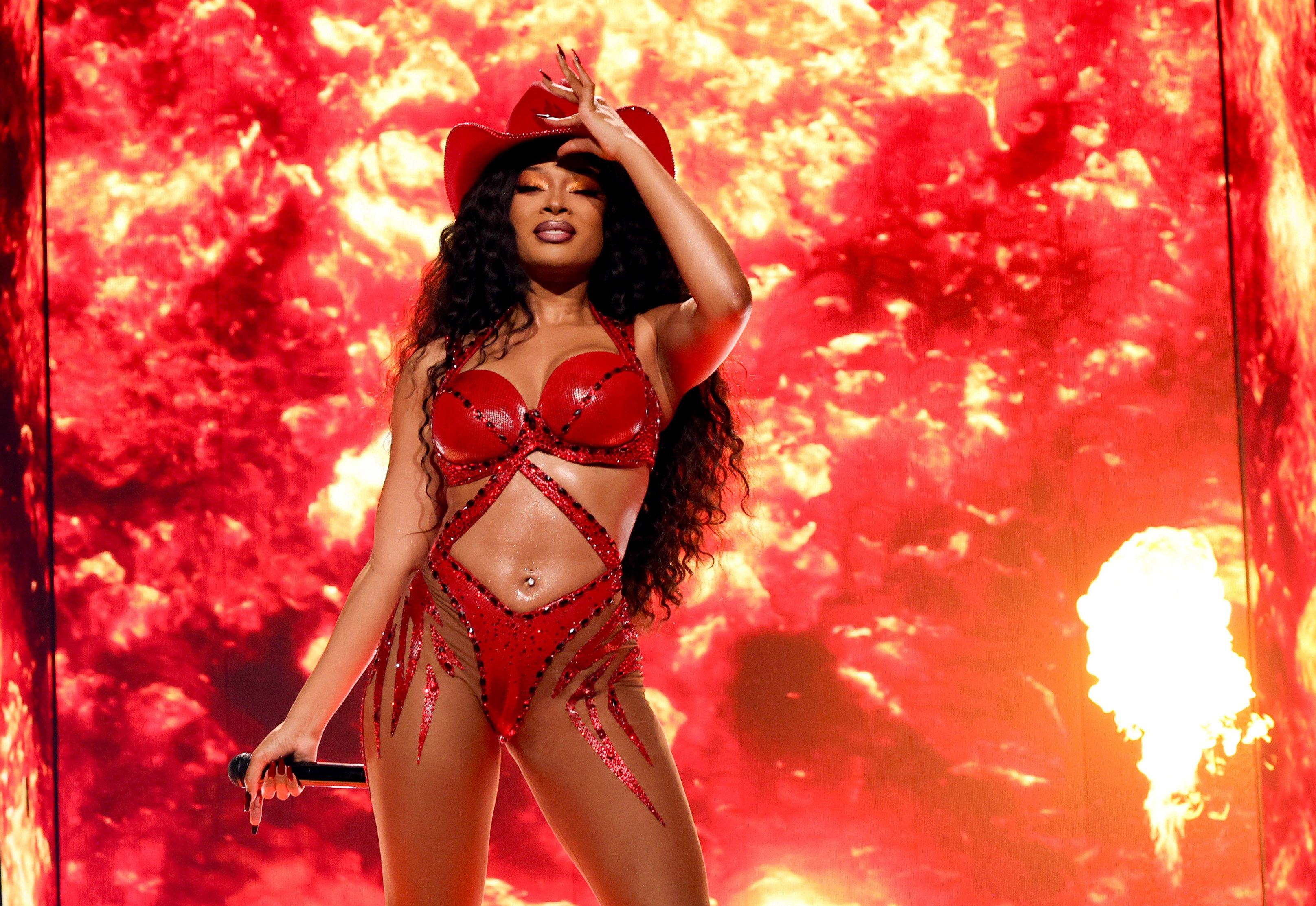
Photo: Kevin Mazur/Getty Images for Live Nation
list
5 Iconic Moments From Megan Thee Stallion's Houston Hometown Shows
Megan Thee Stallion returned to Houston on June 14 and 15 for an epic homecoming filled with surprise guests, gifts and plenty of twerking. Revisit five of the most exciting moments from the Houston stops on the rapper's Hot Girl Summer Tour.
Seven years into her career, Megan Thee Stallion is no stranger to a sold-out crowd. The rapper has been dubbed "Sold-out Stalli" since selling out nearly 20 shows on her Hot Girl Summer Tour — and though her stops at Houston's Toyota Center weren't the first sellouts on the trek, they were considerably the most meaningful ones.
"I'm so happy to be home," Megan, a lifelong Houstonian, told the crowd on June 14, night one of the back-to-back shows. After honing her rap skills and launching her career in H-Town, the star expressed her gratitude for the support her Houston fans have shown her from the start.
"Hotties, y'all know what we've been through, y'all been rocking with me since day motherf—in' one," she gushed on night one. "I love y'all, I appreciate y'all, I respect y'all and I'm very grateful for y'all because, without the Hotties, there would be no motherf—in' Hot Girl Coach."
The two-night stint highlighted Megan's vulnerability, drive and exceptional showmanship. But above all else, her hometown shows reminded fans that she's just a strong-kneed, animé-loving girl from Houston.
Below, check out five of the most memorable moments from Megan Thee Stallion's Houston homecoming.
She Organized A Hottie Egg Hunt
Before stepping on stage on June 14, Megan sent Houston fans on a Hottie Egg Hunt for a chance to win merchandise and tickets to the show that night. The three-part interactive adventure featured clues, documented on Instagram and X, that helped fans locate the golden eggs.
The first clue reads, "A wild stallion can't be tamed…meet me at the place where I'm gonna rock the stage!" The second, "Where I run through the mall with your daddy." The last, "People are smart, my Hotties are smarter, find this egg where I got one degree hotter."
Eager fans scoured the whole city and eventually found the eggs at Megan’s favorite spots in Houston: Toyota Center, The Galleria and Texas Southern University. So far, Houston has been the only city Megan has done this for, making for another special moment between her and Houston hotties.
She Continued To Prove She's A Girls Girl
An unfortunate rap show trend has seen several female opening acts receive hate ahead of male headliners. Luckily this hasn't been the case for Memphis rapper GloRilla, who has noticeably been enjoying her experience as an opener on the Hot Girl Summer Tour.
On night two in Houston, GloRilla presented Megan with a blown-up art piece commemorating her upcoming album, Megan, on stage. In return, Megan complimented the 24-year-old rapper, saying, "Glo is one of the realest women I've ever met."
That evening, Megan showed her love for another rising star — and fellow Houston female rapper — Monaleo. The Mo City rapper sent the crowd into a frenzy as she sang her 2023 hit song "Beating Down Yo Block," which samples the classic "Knocking Pictures Off Da Wall" by Houston's Yungstar.
She Paid Homage To Houston Legends
Monaleo was far from the only Houston native to take the stage with Megan during her hometown visit. On night one, Megan surprised fans with a legendary performance from a few Houston all-stars. The room filled with excited screams as H-Town''s Bun B popped out to perform UGK's "Int'l. Players Anthem (I Choose You)." As if it couldn't get more iconic, Megan joined the legend on stage to rap Pimp C's verse of the song.
The night also featured a legendary performance of "Southside" by Lil Keke, which Megan teased prior in the show with her "Southside Royalty Freestyle." Fans also got to enjoy Slim Thug's verse from "Still Tippin," a song he shares with Mike Jones and Paul Wall. (Wall also performed the song on Megan's tour the previous night at Austin's Moody Center.)
On night two, Megan brought out another Houston great, Z-Ro to rap a classic, "Mo City Don." Though a Hot Girl at heart, Megan couldn't help but celebrate the legendary men who paved the way and left a historic mark in Houston's dynamic hip-hop scene.
She Showed — And Received — Hometown Love
As Megan arrived at the Toyota Center on June 14, she received a surprise welcome by students from her alma mater, the Pearland High School Band and Prancers — a heartwarming kickoff to a night of mutual love between Megan and Houston that put her in high-spirits before the show.
Both nights were filled with an immense amount of energy and support, from Megan signing autographs throughout the show to making sure she got the perfect selfie with her beloved supporters. Even during more tender moments — like “Cobra," a song about suicide and her depression — felt particularly moving because of the interaction between Megan and her hometown fans.
She Put The "Hot" In Hottie
Taking notes from another H-Town hero and fellow Houstonian, Megan put on an impressive show reminiscent of Beyoncé, from jaw-dropping choreography to stunning wind-blown poses. Megan also tapped into her past life as a Prairie View A&M Panther Doll with majorette-inspired dancing during her song "Cognac Queen."
Of course, she wouldn't be Thee Stallion if she didn't show off her twerking skills and famously powerful knees during her two-hour show run. Fans even got to participate in the twerk-fest during intermission, as a "Hottie Cam" panned through the audience, showing love to the girls and boys.
If her hometown shows were any indication, Megan Thee Stallion's future is not just bright — it's smoking hot as well.
